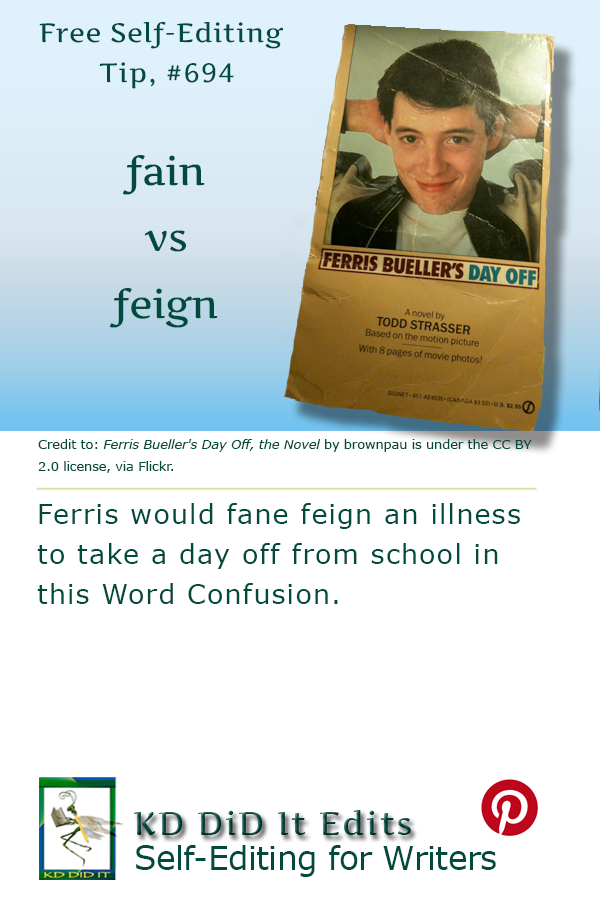Revised as of
17 Nov 2022
A pair of heterographs (a subset of homophone), fain and feign only sound alike, as their meanings are far apart. Not to mention that the former being an adjective and adverb whereas the latter is strictly a verb.
While fain does find you willing (or not) to perform an action, it’s only a description of how you will do it. Feign, on the other hand, is all about the negative fakery that you’ll do.
Fain and feign are sometimes confused with “Faint versus Feint“.
Word Confusions . . .
. . . started as my way of dealing with a professional frustration with properly spelled words that were out of context in manuscripts I was editing as well as books I was reviewing. It evolved into a sharing of information with y’all. I’m hoping you’ll share with us words that have been a bête noire for you from either end.
If you found this post on “Fain versus Feign” interesting, consider tweeting it to your friends. Subscribe to KD Did It, if you’d like to track this post for future updates.
| Fain | Feign |
|---|---|

JRT with Ball by Emery Way (originally posted to Flickr as [1]) under the CC BY 2.0 license, via Wikimedia Commons. — JR would fain chase that ball. |

Rock Hudson in a scene from Embryo, 1976, by Anita Doohan and Jack W. Thomas is in the public domain, via Wikimedia Commons. — It was a shock to many to learn Rock Hudson had feigned heterosexuality . . . and did he ever feign well! |
| Part of Grammar: | |
| Adjective 1; Adverb 2 | Verb, intransitive & transitive
Third person present verb: feigns |
| Adjective: Content 1
[Archaic] Constrained
[Archaic] Glad
[Archaic] Desirous
Adverb:
|
Verb, intransitive: To pretend to be affected by a feeling, state, or injury
Verb, transitive:
To imitate so as to deceive To fabricate, make up [Archaic] To invent or imagine a story or excuse |
| Examples: | |
| Adjective: They were fain to go. He was fain to obey his Lord. “It was only as he exclaimed, ‘Good aunt, I am fain to see thee here!'” (Yonge). “A burst of Homeric laughter was Sir William’s reply — laughter in which all were fain to join” (Frederic). Adverb: Fain, I would go with thee. He would fain be dead. “I would fain improve every opportunity to wonder and worship, as a sunflower welcomes the light” (Thoreau). I would fain do it. |
Verb, intransitive: She’s only feigning, she isn’t really ill. He told the truth because he was no good at feigning. He feigned sickness so he wouldn’t have to go to school. Verb, transitive: She feigned nervousness. He feigned authorship of that novel. Polly could feign another’s voice perfectly. Henry feigned yet another excuse. |
| Derivatives: | |
| Adjective: feigned Adverb: feigningly, feigningly, unfeigning Noun: feigner |
|
| History of the Word: | |
|
Middle English from the Old French feign-, a stem of feindre, from the Latin fingere meaning mold, contrive. |
C’mon, get it out of your system, bitch, whine, moan . . . which words are your pet peeves? Also, please note that I try to be as accurate as I can, but mistakes happen or I miss something. Email me if you find errors, so I can fix them . . . and we’ll all benefit!
Satisfy your curiosity about other Word Confusions on its homepage or more generally explore the index of self-editing posts. You may also want to explore Book Layout & Formatting Ideas, Formatting Tips, Grammar Explanations, Linguistics, Publishing Tips, the Properly Punctuated, Writing Ideas and Resources, and Working Your Website.
Resources for Fain versus Feign
Some of these links may be affiliate links, and I will earn a small percentage, if you should buy it. It does not affect the price you pay.
Apple Dictionary.com
Dictionary.com: fain and feign
Frederic, Harold. In the Valley. <https://amzn.to/3S02TiV>.
The Free Dictionary: feign
Thoreau, Henry David. Wild Fruits. New York City: W. W. Norton & Company, 2001. Print. <https://amzn.to/3B5BvsJ>.
Yonge, Charlotte M. The Armourer’s Prentices. Gutenberg.org. 2007. <https://www.gutenberg.org/files/21222/21222-h/21222-h.htm>.
Pinterest Photo Credits:
Ferris Bueller’s Day Off, the Novel by brownpau is under the CC BY 2.0 license, via Flickr. The background of the photo was removed and the levels adjusted in Photoshop.


